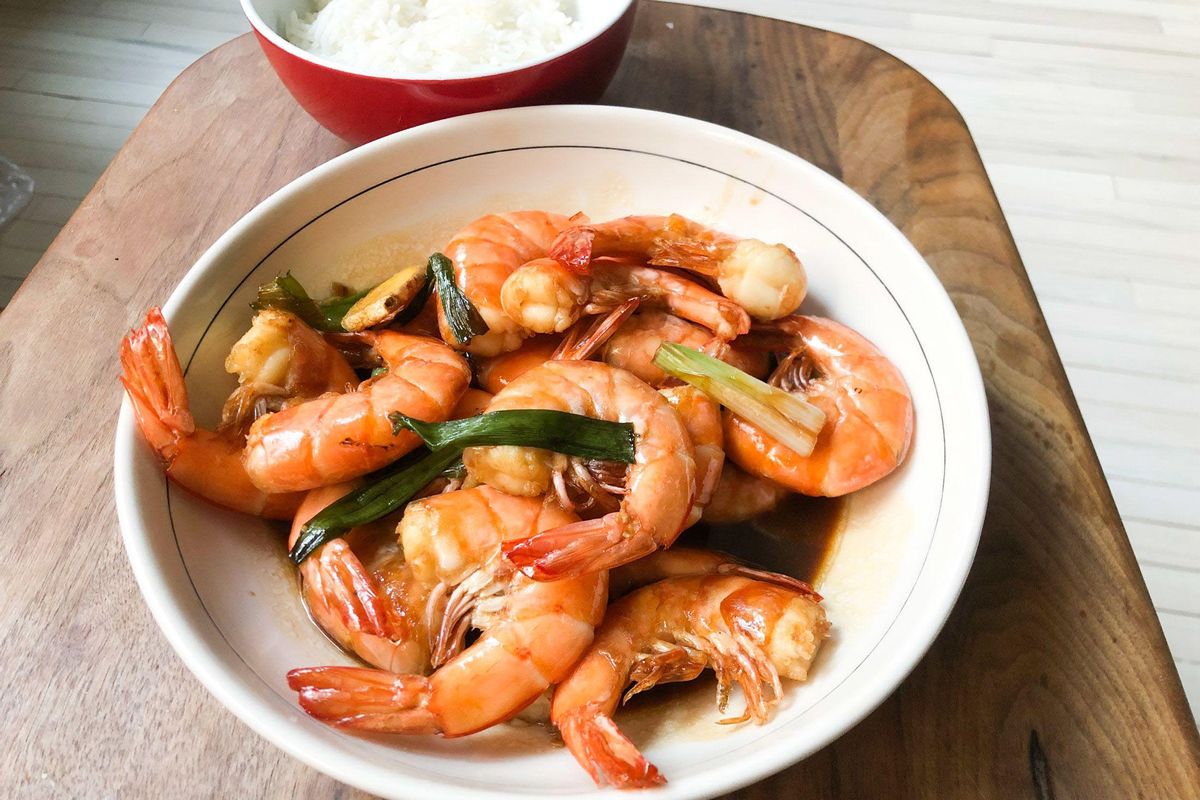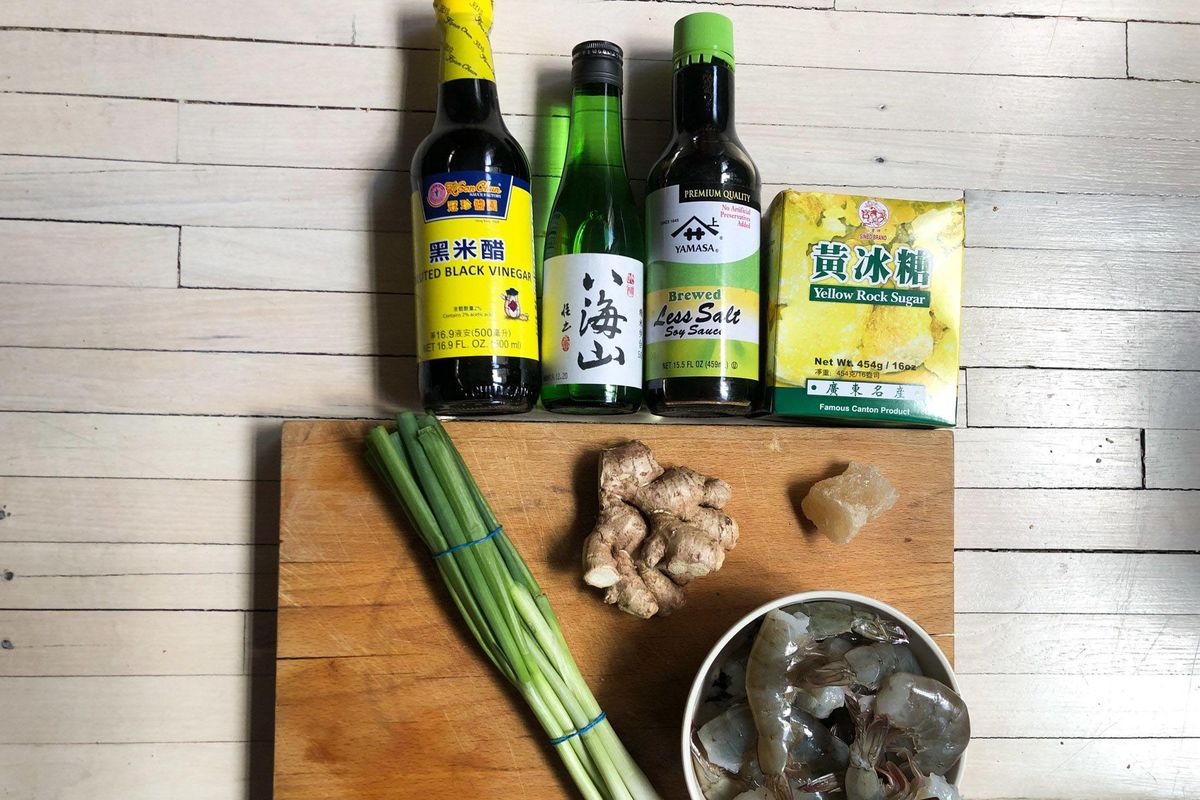A Lunar New Year celebration recipe features shrimp with fireworks
Oil exploded shrimp is easily and quickly prepared in a matter of minutes, including prep and measuring time. (Kate Krader/Bloomberg)
Red banners and signs are starting to adorn doors and stores and streets, which means the world is getting ready for the start of China’s Lunar New Year on Feb. 1. More than 2 billion people across the globe are expected to celebrate the Year of the Tiger, but it will involve more local and stay-at-home festivities this year than usual: China’s Ministry of Transport has forecast that this year’s holiday travel will be down 60% in the country from pre-pandemic levels as a result of COVID-19 outbreaks across the country.
For everyone staying close to home, Lunar New Year is an excellent opportunity to support your neighborhood restaurants. It’s also a chance to dig into a cookbook that speaks to the holiday. One of those is “My Shanghai: Recipes and Stories From a City on the Water” by Betty Liu (Harper Collins; $28), which was released last March.
It’s a stunning book from both a visual and a storytelling point-of-view. The images come from all over Shanghai, featuring landscapes and fishermen and farmers, as well as the kind of pictures that make you immediately hungry. The images are accompanied by recipes that transport you to a home kitchen in China thanks to Liu. She takes on the formidable task of chronicling her family’s Shanghai dishes, which had not been put down on paper.
The book is stocked with good candidates for Lunar New Year such as steamed fish (symbolizing luck) and golden egg dumplings (fortune), cooked quickly on a hot ladle in Liu’s delightful rendition. One of the book’s most compelling pictures is for scallion oil noodles, representing longevity. But Liu looks beyond obvious candidates for holiday menus. “Lunar New Year is also about celebration of food with your family, so there are more choices than people think,” she says.
An excellent candidate is one with a powerful name, Oil Exploded Shrimp. “The name sounds more aggressive than it is,” Liu says. She likes it for Lunar New Year because of what its Chinese name represents. “Xia is the name for shrimp in Chinese and xiao is the word for laughter. Because the words are so similar, you can say that shrimp can symbolize laughter or happiness for the coming year,” Liu says. It’s one of her favorite “quintessentially Shanghai-ese” classic dishes.
It’s also easily and quickly prepared in a matter of minutes, including prep and measuring time. Liu makes her dish commanding by frying the shrimp twice, which shocks them so the shell becomes extra crispy and the meat notably succulent. The shrimp are then sautéed in an aromatic mix of soy sauce and rice wine, scallions and ginger, just enough to thicken and provide the shellfish with a thick, sweet and pungent caramelized sauce.
Liu’s advice for people who aren’t familiar with Chinese cooking: Don’t stress. “These recipes are very forgiving. Traditional cooking can scare people, but substitutions work.” For instance, you can easily use inexpensive dry sherry if you can’t find Chinese Shaoxing wine. Or open a bottle of sake and drink that with the shrimp after you’ve transferred the steaming, fragrant seafood from wok to plate.
Oil Exploded Shrimp
1 cup neutral cooking oil, such as canola or grapeseed oil
1 pound whole, unpeeled shrimp (about 15 to 20 heads), trimmed and deveined
1 scallion, cut into 2-inch segments, smashed
3 thick slices fresh ginger, smashed
2 tablespoons Shaoxing wine, dry sherry or sake
2 tablespoons crushed rock sugar or granulated sugar
2 tablespoons soy sauce, preferably light
2½ teaspoons black vinegar
Heat the oil in a wok over high until it reaches 375 to 400 degrees on a deep-frying thermometer. Working in batches if necessary, place the shrimp into a long-handled metal sieve or spider and gently slide them into the hot oil. Use the sieve to gently stir and flip the shrimp. (Be careful as the oil will spatter.)
After 10 seconds, use the sieve to transfer the shrimp to paper towels. The shrimp should be orange and starting to curl up.
Let the oil heat up again. Slide the shrimp into the oil again and fry for an additional 15 to 20 seconds, until they crisp up. Remove with the sieve. Pour the oil into a heatproof container. (This shrimp-infused oil is fabulous in other dishes, and a little goes a long way.)
Wipe the outside of the wok to remove any oil drips. Set the wok over high heat until the residual oil is shimmering. Add the scallion and ginger and stir fry until aromatic. Add the shrimp, stir fry once or twice, and add the wine.
Stir fry once or twice, and then add the sugar and soy sauce. Stir fry to mix: It will bubble, and caramelization is the goal. Keep stir frying as the sauce becomes thick, coating the shrimp. Splash with the vinegar, stir fry for another 5 seconds, then remove to a plate with the sauce. Serve hot.
Yield: 4 servings

